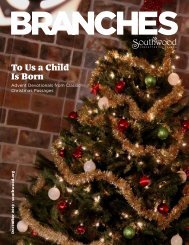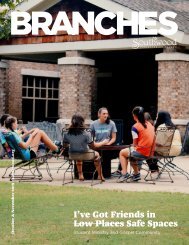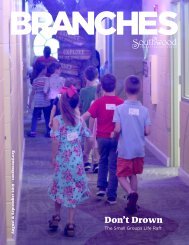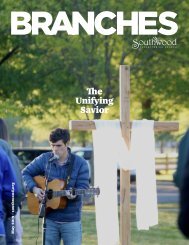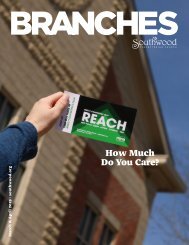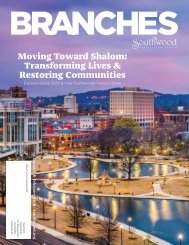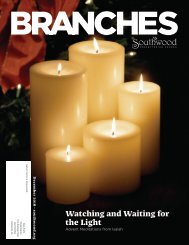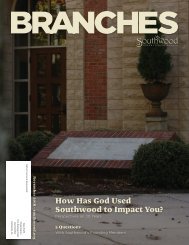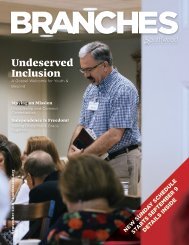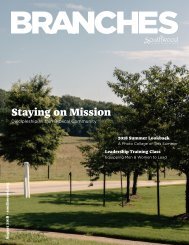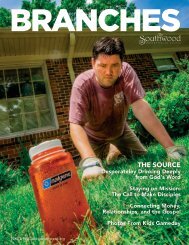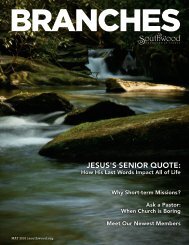Create successful ePaper yourself
Turn your PDF publications into a flip-book with our unique Google optimized e-Paper software.
<strong>BRANCHES</strong><br />
STRUGGLE TO BE FREE<br />
OR FREE TO STRUGGLE<br />
Surviving summer<br />
in Small Groups<br />
Peru stories<br />
JULY <strong>2014</strong> | southwood.org
SOUTHWOOD<br />
contents<br />
ABOUT THIS ISSUE<br />
Free-dom! Whether that makes you think of William Wallace, the stars and stripes,<br />
or broken chains, welcome to <strong>July</strong>! Independence Day festivities with family,<br />
friends and small groups sets the tone for the season. But we’ve got all kinds of<br />
freedom to talk about.<br />
Consider the freedom from technology felt by our students and leaders on the<br />
Peru mission trip. They came back changed and want to share that feeling with<br />
you. Our General Assembly met last month, and they focused their agendas<br />
on freedom from persecution, racial issues, and sexual abuse. Southwood has<br />
partnered with Freedom School this summer. And you’re all free to run in the .5K,<br />
and get a free t-shirt! How’d we get so much freedom in one issue?<br />
Yet we all know that the freedom that really matters is that granted by the<br />
grace of God. Jean answers questions from his recent series regarding faith<br />
and faithfulness and our motivations to holiness, and poses 20 questions to ask<br />
yourself to understand this freedom. Our feature this month is an illustration from<br />
a recent sermon entitled “Are you free to struggle or struggling to be free?” and<br />
gives a helpful framework for understanding how our faith in Christ motivates our<br />
freedom in Christ. It’s a long read, but you’ll be rewarded with a montage of our<br />
cute VBS kids on the following pages!<br />
2 about this issue<br />
3 pastor’s note<br />
REFLECT<br />
8 struggle to be free<br />
or free to struggle<br />
RESPOND<br />
4 ask a pastor<br />
Sanctification/Justification<br />
RELATE<br />
5 recapping G.A. <strong>2014</strong><br />
Selfies by Will<br />
6 peru stories<br />
Summer <strong>2014</strong> Missions<br />
12 vbs/climb <strong>2014</strong><br />
Photo Montage<br />
14 surviving summer in small groups<br />
Summer Social Ideas<br />
<strong>BRANCHES</strong><br />
EDITOR-IN-CHIEF Jonathan Barnette<br />
DESIGNER Phillip Lackey<br />
CONTRIBUTORS<br />
Will Spink<br />
Sarah Niemitz<br />
Niña Banta<br />
James Parker<br />
Anna Gandy<br />
Steve Williams<br />
PHOTOS<br />
Jonathan Barnette<br />
Daniel Brown<br />
Will Spink<br />
Winnie Winford<br />
Katie Cochran<br />
Kalie Deaton<br />
FEEDBACK!<br />
We want to hear from you! Please send<br />
your suggestions and comments to<br />
branches@southwood.org<br />
1000 CARL T. JONES DRIVE | HUNTSVILLE, ALABAMA 35802<br />
(256) 882-3085 | WWW.SOUTHWOOD.ORG<br />
Jonathan Barnette, Editor<br />
JEAN F. LARROUX, III Senior Pastor<br />
MELISSA PATTERSON Executive Assistant<br />
ADULT MINISTRIES<br />
SARAH NIEMITZ Director of Community Development/Assimilation<br />
JAMES PARKER Chief Musician<br />
WILL SPINK Associate Pastor/Shepherding<br />
STUDENT MINISTRIES<br />
KIM DELCHAMPS Administrative Assistant<br />
NIÑA BANTA Director of Children<br />
NANCY McCREIGHT Assistant Director /Children/Nursery<br />
CHAD TOWNSLEY Associate Pastor/High-Life<br />
WINNIE WINFORD Assistant Director/High-Life<br />
MINISTRY SUPPORT<br />
TERRI GOOD Accountant/Bookkeeper<br />
JONATHAN BARNETTE Director of Communication<br />
PHILLIP LACKEY Graphic Designer<br />
JANICE CROWSON Director of Facilities/Finance<br />
LYNDA CLAYDON Facilities<br />
MIKE MARREN Facilities<br />
ELIZABETH BUTZ Receptionist<br />
15 all that is fair<br />
Farthest Shore by David Wilcox<br />
UPCOMING<br />
EVENTS<br />
Kid's Water Wars<br />
<strong>July</strong> 10<br />
Intown<br />
<strong>July</strong> 14-17<br />
.5K<br />
<strong>July</strong> 20<br />
Sr. High Beach Retreat<br />
<strong>July</strong> 24-27<br />
Movie Night<br />
August 8<br />
2 JULY <strong>2014</strong> | SOUTHWOOD.ORG
PASTOR’S NOTE<br />
20 Questions to ask yourself...<br />
It is as old as the Apostle Paul and it comes up in every generation. It is the assumption that preaching<br />
the radical, free and accepting grace of God is the first step on a licentious, slippery slope toward<br />
antinomianism. The fear is that free grace for sinners is going to lead to free sinning. The reality is<br />
quite the opposite. Free grace leads to freedom from sin, not freedom to sin. Before dismissing<br />
grace as the "easy way out" try answering & applying these 20 questions to your life.<br />
1. Think of your most habitual sin. How often have you committed or thought about committing<br />
this sin? (We'll call this sin your "darling" sin)<br />
2. Have you ever made plans to commit this sin even though you knew it was wrong?<br />
3. Are you certain that you are converted? What makes you certain? (Note: This is an honest<br />
question we should always ask ourselves but especially when we see habitual sin!)<br />
4. Have you ever felt guilty after committing this sin and then in order to comfort yourself actually<br />
committed the same sin again?<br />
5. Have you ever judged another person for this same "darling" sin? Have you secretly feared<br />
being exposed for being this kind of sinner?<br />
6. Have you ever thought this sin was one that you would "always have to deal with" therefore<br />
given yourself a subtle free pass to indulge in it?<br />
7. Are there other sins such as self-service, love of comfort or pride behind your darling sin? Name<br />
them.<br />
8. Are there excuses you make for your sin, i.e., blaming others, environmental factors such as sleep, work or other circumstances?<br />
9. Have you ever lied to yourself or anyone else about this "darling sin"? Why?<br />
10. Where is Jesus in your struggle: Is he a cheering coach? A disappointed parent? A judge with limited options? A savior who tolerates<br />
you? Or a bride groom who loves you no matter what?<br />
11. Describe how you feel about yourself after struggling with this sin for all these years. How powerful is your desire to see your life purged<br />
of that shame?<br />
12. List every strategy you have ever used to try and conquer this sin. If you changed or stopped some of your present strategies for<br />
managing this sin what might happen?<br />
13. How much relief do you feel when those strategies restrain your behavior for a season of time? Might you be employing aggressive sinfighting<br />
strategies in order to be free from the burden of dealing with these sins?<br />
14. If you might actually be "working on" this darling sin to actually free your conscience from your struggle rather than to free your life from<br />
the offense it is to God, then wouldn’t you have to say that your repentance is tainted with self-love?<br />
15. How do you fix the fact that even your desire to conquer your sin is sinfully self-serving?<br />
16. If an unbeliever was trapped in a seemingly never-ending struggle with sin what hope would you offer to him? (p.s. the answer is Jesus!)<br />
17. Is there really anything, short of confession, repentance and resting in what Jesus has done sufficient to truly deal with your sin cycle?<br />
18. If you could go to God right now and be forgiven, loved and accepted, i.e., given a "totally clean state" would you? Is that kind of love<br />
and forgiveness going to set you free to indulge your "darling" sin more or give you something more beautiful to love, i.e., the Father?<br />
19. What might your spiritual life be like if you placed love, forgiveness and acceptance ahead of your sin-management strategies? Does<br />
God care how your war against sin is waged?<br />
20. What is the difference between fighting your sin in joyful response to His acceptance and working hard against your sin in a subtle effort<br />
to gain his re-acceptance? Which pattern produces humility and love for other struggling sinners? Which pattern produces pride and<br />
fear of future failure?<br />
Consider spending the next season of your life focused on Christ and his work on your behalf. Allow<br />
your life to be a living response to his forgiveness & grace and not your obligation and duty because<br />
of forgiveness & grace. Something will happen: Jesus will get bigger. You will get smaller. The "darling"<br />
sin will subside and you won’t feel a sense of prideful accomplishment. You will feel amazed.<br />
From that posture you will love God in response to his love, love others like you have been loved,<br />
and love things you never dreamed you would love—worship, prayer, Scripture and service to others.<br />
Grace does create a slippery slope, but it is a slippery slope toward holiness not away from it.<br />
For more from Jean, check out<br />
his sermons at southwood.org<br />
jean.larroux@southwood.org<br />
@jflarrouxiii<br />
Jean F. Larroux, III<br />
Senior Pastor<br />
JULY <strong>2014</strong> | SOUTHWOOD.ORG 3
SOUTHWOOD<br />
respond<br />
ASK A<br />
PASTOR<br />
Jean F.<br />
Larroux, III<br />
Answering your questions<br />
about sanctification and<br />
justification.<br />
Are merit, guilt, or fear ever appropriate<br />
as secondary motivations (to holiness)?<br />
First, let me say that merit, guilt and fear are present in all<br />
of our motivations, but the most important word in your<br />
question is "appropriate." If by appropriate you mean acceptable<br />
or approved by God as the motivation he would desire for us, even<br />
secondarily, then the answer is "no." God is always concerned with<br />
our behavior and the beliefs behind our behavior. Appropriate<br />
motivations for holiness were only present in the heart of Christ who<br />
obeyed for the Father’s glory, not his own.<br />
That leaves us with a bit of a quandary. Since all of our actions, even<br />
the best ones, are motivated to some degree by a desire for merit, a<br />
desire to cleanse a guilty conscience or driven by some level of fear,<br />
then are we to do nothing since nothing we do is pure? Absolutely not!<br />
While the motivations of believers are not righteously appropriate,<br />
they co-exist with new longings that are appropriate for the adopted<br />
children of God. I now desire to pray. I now desire to worship. I now<br />
desire to commune with my Heavenly Father because the Spirit has<br />
placed appropriate desires alongside my inappropriate ones within<br />
my double-minded heart.<br />
Our calling in the Christian life becomes clear: confess the complexity<br />
of mixed motives in our hearts and cling to Christ as the only one<br />
whose obedience was pure. From that posture we worship, pray and<br />
embrace all the means of grace as people utterly dependent on grace.<br />
To simply forge ahead into pious behavior with an acceptance of<br />
impious motives, even secondarily, is not holiness at all. It is behavioral<br />
modification without heart transformation. The calling for believers<br />
who see mixed motives in their hearts is repentance and a return to<br />
their Savior. In that world Jesus exists as a present-tense Savior of<br />
whom we can say, “I need thee every hour…” Holiness for them is<br />
marked by a dependent faith in Christ not by faithfulness for Christ.<br />
You keep saying that we need to focus on<br />
"believing NOT behaving" and that this is<br />
about "faith NOT faithfulness." I already<br />
believe. These seem to be messages geared<br />
toward unbelievers? Am I hearing that right?<br />
First off, no, you are not hearing me right if you think these<br />
messages are just for unbelievers. Secondly, yes, you are<br />
hearing me right when you hear me say that this is about<br />
"faith NOT faithfulness" and "believing NOT behaving."<br />
My suggestion to you would be this: go to our website and rewatch<br />
the sermon (video slides included with the audio online<br />
at southwood.org/knots) called, “How to love a Jerk.” It is an<br />
extensive explanation of how "believing" something actually<br />
produces behavioral change. In every realm of life we understand<br />
that our beliefs drive our behavior. If I believe it is going to rain then<br />
I bring an umbrella to work. If I believe that gluten is making me sick<br />
then I adjust my diet. If I believe that my parents love me no matter<br />
what then I play soccer differently. I cheerlead differently. I play in the<br />
band differently. Beliefs always precede behavior in life and in faith.<br />
When I say, "believe the Gospel" or say we need to "have faith" I am<br />
referencing the entire process of believing and applying the Gospel<br />
to your life as described in that message. It is easy to think that when<br />
I say "believe" or "have faith" that I am simply encouraging a mental<br />
rehearsal of propositional truth: "Jesus is the son of God. He died<br />
on the cross. He rose again…" Repeating those phrases is not an<br />
exercise of faith or belief. Remembering the Gospel means taking<br />
those propositional truths and pastorally applying their implications<br />
to your life—If Jesus is the Son of God; if Jesus did indeed die on the<br />
cross; if he actually rose again then the implications of those truths<br />
are profound. They transform life for the husband who is unwilling to<br />
apologize for being selfish or the teenager who missed curfew or the<br />
woman who finds it difficult to forgive a neighbor.<br />
The Gospel speaks to all areas of our lives in deep ways. The<br />
propositional truths have powerful implications. God uses the means<br />
of grace—worship, prayer, Scripture reading, the sacraments, etc. to<br />
connect and reconnect us with the reality of what it means to be in<br />
Christ. That reality has propulsion and trajectory to thrust us into this<br />
world as people who have been transformed by His love committed<br />
to seeing this world transformed by that same love.<br />
4 JULY <strong>2014</strong> | SOUTHWOOD.ORG
elate<br />
SOUTHWOOD<br />
RECAPPING G.A. <strong>2014</strong> Will Spink<br />
The 42nd General Assembly of the Presbyterian Church in America<br />
(PCA) was not marked by substantial controversial debate on the floor<br />
of the assembly. While some decry that as an indicator that nothing<br />
significant occurred, my sense from being there in Houston was quite<br />
different. In the first place, it signifies<br />
a general unity in core commitments<br />
that is allowing us to avoid focusing on<br />
intramural debates so as to provide<br />
proper attention to the mission of<br />
Christ’s Church. In addition to this, I<br />
see many hopeful and encouraging<br />
developments outside the formal<br />
meetings – in worship services,<br />
seminars, fellowship dinners, and<br />
other informal gatherings.<br />
The PCA did make what many<br />
consider the strongest statement any<br />
Christian denomination has made<br />
regarding child protection from<br />
sexual abuse. This resolution calls<br />
on local church leaders and heads<br />
of PCA committees and agencies to<br />
review their policies in these areas<br />
and to follow local laws in reporting<br />
such abuse. Perhaps even more<br />
remarkable is that such a strong<br />
resolution passed with no opposing<br />
votes from the approximately<br />
1,000 delegated commissioners.<br />
To read more on this including the<br />
text of the resolution, visit http://<br />
boz.religionnews.com/<strong>2014</strong>/06/20/<br />
denomination-confronts-childsexual-abuse-positive-step-forward/.<br />
#yolo<br />
#GA<strong>2014</strong><br />
In other official action, the denomination received a report from a<br />
study committee on Insider Movements, which contains advice and<br />
recommendations with regard to Muslims converting to Christianity<br />
and how to handle the complex realities they face in majority-Muslim<br />
countries. We also passed a resolution and prayed for Christians facing<br />
persecution for taking biblical stands regarding sanctity of life and<br />
marriage issues in our culture and in other countries as well.<br />
#selfie<br />
Moderated very well by Dr. Bryan<br />
Chapell, the brotherly spirit of<br />
the debate and discussion on the<br />
floor (which is never something to<br />
be taken for granted!) reflected<br />
the hopeful atmosphere at the<br />
assembly in general. Seminars<br />
discussing honestly the history<br />
of racial issues in the church and<br />
highlighting the need for increased<br />
racial and socio-economic<br />
diversity in the PCA were both well<br />
attended and well received. This<br />
conversation is certainly only the<br />
beginning of what is needed, but<br />
the diversity of people engaged in<br />
the conversation is promising.<br />
Worship services are always a<br />
highlight of the assembly, and this<br />
year was no exception. All three<br />
messages were outstanding, but<br />
the one at the opening service<br />
set the tone for the rest of the<br />
assembly and was delivered by<br />
Ray Cortese, pastor of Seven Rivers<br />
Presbyterian Church in Lecanto,<br />
Florida. If you listen to one thing<br />
from GA, this sermon, titled “A<br />
Beautiful Orthodoxy,” is worth<br />
your time. Go to http://www.<br />
lightsource.com/ministry/pcageneral-assembly/broadcast-archives.html<br />
and scroll down to the first<br />
video from “Session 1 – Tuesday, June 17, <strong>2014</strong>.” The sermon begins at<br />
38:00. After you enjoy this message, you can make your plans to drive<br />
up to Chattanooga next June to enjoy a GA worship service in person!<br />
FREEDOM<br />
This summer Southwood has had the opportunity<br />
to partner with Freedom School through<br />
The Village of Promise by providing snacks. The<br />
Freedom School is a six-week summer program<br />
designed to instill students from struggling<br />
schools with a love for reading and a passion for life-long learning.<br />
Each morning begins with "Harumbe" (Swahili, translated "working<br />
together")—a high energy celebration designed to remind both<br />
scholars and teachers at Freedom School that they are are working<br />
together to grow as thinkers and learners. Scholars are reminded each<br />
day that, as image bearers of God, they have the capacity to learn and<br />
overcome challenges in creative ways. If you are interested in learning<br />
more about The Village of Promise in Huntsville and how you can connect<br />
with Freedom School or other volunteer opportunities throughout<br />
the year, please contact sarah.niemitz@southwood.org.<br />
JULY <strong>2014</strong> | SOUTHWOOD.ORG 5
SOUTHWOOD<br />
PERUSTORIES<br />
6 JULY <strong>2014</strong> | SOUTHWOOD.ORG
ANNA GANDY<br />
I have this desire to have a simplified take away from ten days<br />
in and around Kusi, Peru, but I haven't been able to stratify<br />
any thoughts to the extent of creating some kind of moral or<br />
theme. Maybe there's a metaphor in the gigantic mound of<br />
dirt that the mission team and I spent days moving approximately<br />
five feet to the left that never seemed to end. Something<br />
about the seeming futility of life and little things being<br />
what make up something great, but I don't really have it yet.<br />
Peru was this incredibly rich experience that I can not succeed<br />
in putting into words, but I will attempt to do anyway.<br />
There is this strangeness in how similar things in places continents<br />
apart can be. The boys at the home we stayed and worked at<br />
played soccer and threw things at the dogs and wrestled just like<br />
boys their age do everywhere. They just spoke Spanish. Church<br />
services in Yunguy felt like services here in Huntsville, again just<br />
in Spanish. I came with this expectation of massive cultural differences,<br />
but instead was given this portrait of similarity in human<br />
nature. People there struggle with drugs and alcohol, lack of faith<br />
and instances of human cruelty. People here struggle with the<br />
same things. They may manifest themselves differently, but at<br />
heart there's the commonality of searching for identity and searching<br />
for purpose. There's a commonality in finding joy and finding<br />
pain in interacting with other people, in a deep desire to love and<br />
be loved. It's so easy to forget that humanity is universal. It's so<br />
beautiful that it is.<br />
Cultural differences still do exist. Peru has less material, so it bases<br />
less value on material things. There is a pure joy found in the boys<br />
there that exists not from having much, but from having contentment<br />
with little. There is less ambition for things like higher education<br />
because it's simply not something that is in reach. Things are<br />
accomplished not through the intensity of desire as in the United<br />
States, but through practical consideration of what can and cannot<br />
be done. It is not for a lack of passion, nor is it something better<br />
or worse than the American ideology that anything is possible. It<br />
is simply how life is.<br />
SOUTHWOOD<br />
Life in the mountains of Peru was easy to adapt to. I missed the<br />
high availability of hot water for showers, but I did not miss the air<br />
conditioning. There was no feeling of loss accompanying a lack of<br />
my phone and thus a lack of internet and social media. The mountains<br />
were astonishingly beautiful, food was different but delightful,<br />
work was hard but in the pleasant way that an intense work<br />
out is hard. Coming back to America was jarring. I held my phone<br />
again and it felt like a completely foreign object in my hands. Suddenly<br />
the world was at my fingertips again and I realized I might<br />
not want it to be. There was an immediate loss of contentedness<br />
that I was entirely aware I had until the feeling had been replaced<br />
by the very American striving for something more. In Peru I looked<br />
at myself in the mirror maybe once every two days and suddenly<br />
I returned to seeing my reflection more than every hour. I did not<br />
feel at home in my house and it was odd to lack a relief in getting<br />
there. Everything is so much more in America than in Peru; more<br />
electricity, more buildings, more choices. It's overwhelming.<br />
I'm still not sure of the moral of my Peru story. I'm honestly still<br />
a little overwhelmed to be in the states again. I am undoubtably<br />
ready to continue to travel, to continue experiencing different cultures<br />
and different people. If I was asked to leave again tomorrow,<br />
I would. I miss the mountains. I miss the night sky full of South<br />
America's stars. I continue to look for fulfillment and hope to one<br />
day reach this enlightenment that supposedly exists and know why<br />
I'm here and why it matters that I am. Maybe as a result of this trip<br />
I'll attempt to live a little more simply, to want less, to gather less<br />
worth from how well I'm received on the internet, to gather less<br />
worth from my appearance and more from my actions. Maybe I'll<br />
learn from the example of boys who are happy with much less.<br />
Maybe I'll have more faith like the couple who gave up their lives to<br />
raise forty abandoned boys because that's what God called them<br />
to do. At the very least I've gained lots of photos of me covered<br />
in mud and some random Spanish phrases, but I so hope that is<br />
not all.<br />
STEVE WILLIAMS<br />
I love youth, and have spent much of my time working with<br />
the youth wherever God has led me, which has been primarily<br />
at Southwood over the past several years. As far as missions<br />
outside the country, the Peru mission trip was my first<br />
experience of this type as it is a significant commitment of<br />
time away from the office. Although we met several times<br />
prior to leaving for Peru, I was still somewhat uncertain what<br />
to expect when we gathered at the airport and headed out.<br />
We were equipped with a great energetic team that was focused<br />
on the mission of expressing God’s grace to the boys<br />
and staff at Kusi. What God had planned for us was more<br />
amazing than I think anyone in the group expected.<br />
The first adjustment was the loss of communications. I’m used to<br />
seeing people with their smartphones in-hand texting, Instagram,<br />
Facebook, Twitter etc. Instead they were talking, reading and playing<br />
cards. The adjustment seemed instantaneous and it was good<br />
to see that we can survive and even thrive with and without our<br />
electronic attachments. Travel was long as we flew the first day<br />
and spent 10 hours on a bus the second day to get to Yungay. The<br />
team was greeted with Peruvian hospitality and we felt very welcome<br />
at their home in Kusi. We played a quick game of soccer, in<br />
which the boys graded our ball skills, at least subconsciously.<br />
We spent the week moving rocks, mixing concrete and making<br />
adobe bricks which included moving several cubic yards of dirt 10<br />
feet to break it up and remove the rocks and mixing it with water<br />
and straw and placing into the molds. Sounds easier than it is, and<br />
I was extremely proud of how the team worked together! Follow<br />
that with wrestling, soccer and just running around with the boys<br />
and you have one of the most effective weight loss programs de-<br />
veloped, if it was not for the wonderful food that was provided.<br />
Now to what really mattered; the boys, ages six to nineteen. I have<br />
not seen the contentment here that I experienced in Kusi. These<br />
boys had a soccer ball, trompos (wooden tops), frisbee (that I think<br />
was eaten by Sam the big dog), some marbles, two bikes and a<br />
scooter; no XBox, TV, phones, cars etc. The boys almost always<br />
were smiling and seemed thrilled to have us there with them. We<br />
did crafts with the boys and just hung out with them trying to speak<br />
Spanish and they would reciprocate with a little English. The highlight<br />
of the week for me was Thursday night at the campfire. A few<br />
of the boys shared their testimony, however one of the boys had<br />
been at the home for several years and he shared his testimony for<br />
the first time with us. What a special moment it was as Rosa and<br />
Anhil (the house parents) came to his side as he shared. God’s love<br />
and grace covers Kusi and it’s evident in the boys.<br />
I went to express God’s love and grace and I felt that I was the<br />
recipient from the boys, the staff and the team rather than the provider.<br />
I think the boys enjoyed spending the time with us even<br />
more than they like Nutella! The team was tired at the end of the<br />
week, but there wasn’t anyone who wouldn’t have stayed longer if<br />
possible. We left at 6:30 on a Saturday morning and the boys came<br />
out to see us off with warm wishes and hugs. I’m pretty sure most<br />
of our kids are asleep at that time on Saturdays, but not saying they<br />
didn’t go back inside and climb in bed.<br />
What did I bring back from Peru? A clearer understanding of the<br />
work God is doing in Kusi, boundless grace, love for the boys and<br />
my own Trompo.<br />
JULY <strong>2014</strong> | SOUTHWOOD.ORG 7
Are you Free to Struggle?<br />
I want you to imagine a man who has abandoned reading Scripture and has a secret addiction to<br />
pornography. Imagine that same man writing a letter to his pastor, confessing the struggle and asking<br />
for help. Imagine a pastor writing a "Dear Abby" type response to his question. This is the letter I<br />
would have written when I was just out of Seminary. I want you to critically listen to every word:<br />
Dear Trapped,<br />
First, I understand. I can remember that struggle well. When I first became a Christian it was really<br />
hard to give up old habits and sins. You need to know that no one in the church is perfect. Jesus died for<br />
sinners and it may surprise you but there are a lot of people who struggle like you do. You’re not alone.<br />
The church is a place for sinners.<br />
Second, your letter is really a sign that God is working in your life. Conviction of sin comes from him<br />
and he will not leave us to our own devices. That is actually a good thing and not a bad thing. Too many<br />
people in our society and in the church today just treat sin as if it doesn’t matter. It does matter.<br />
God is holy and his law never changes. Adultery, lust, pornography and sexual sin are all wrong, even if our<br />
society decides they are not.<br />
Third, Jesus came to redeem you from yourself. Believers are told that if any man is in Christ he is a new<br />
creation. We are all new creations in Christ and this means that we must put off the old man and put on<br />
the new man. It is easy to deceive ourselves into thinking that we can "have our cake and eat it too" but<br />
we cannot. We can’t claim that we are Christians and then live like the devil.<br />
Fourth, repentance is always hard but the cross is always available to you. I know you’ve confessed your<br />
sins to me, but they need to be confessed to God from a heart that is sincere. We can’t just say, "I’m<br />
sorry" and think that makes everything better. We have to really mean it. When we really mean it we<br />
show it. I can remember asking my college roommate to help keep me in check with my girlfriend. We never<br />
"did anything" but you can’t just "say" you hate your sin and then not do anything about it, right?<br />
Fifth, I’m gonna send you some helpful verses about sexual sin, lust and forgiveness. Memorizing these and<br />
keeping them close at hand or hidden in your heart is vital to victory. Remember God’s grace is sufficient<br />
for you and the sword of the Spirit is a powerful thing. To have His word as part of your armor is most<br />
helpful. I have several verses written on 3x5 cards in my office, my car and at home. Keep his truth in<br />
front of you.<br />
Lastly, let me offer to walk with you. I told you that I can still remember the struggle. I know what<br />
you are going through. If I had not had accountability I don’t know where I would have ended up. I<br />
will meet with you, find other men who have been through this who can be prayer warriors for you and<br />
I will promise to hold you accountable. I will even help you put software on your computer or passwords<br />
on your television to protect. I also know of a service that will send me email reports of your browser<br />
history. That may be a good way for us to make sure that in this season we don’t let down our guard and<br />
allow Satan to get a foothold.<br />
Keep the faith and fight the good fight,<br />
Pastor Larroux<br />
8 JULY <strong>2014</strong> | SOUTHWOOD.ORG
or Struggling to be Free?<br />
Now I want you to imagine that this same pastor, me, has written a different letter, but this letter<br />
is written after coming to the end of myself. It is written after years of ministry and after coming to<br />
the place of understanding that there is nothing I have to offer God except my sin and his son Jesus<br />
Christ. Listen intently to every word, but keep the first letter in the back of your mind:<br />
Dear Trapped,<br />
First, I understand. I have been there again and again. Even when I am not struggling with lustful actions in my<br />
life I see those desires rattling around in my heart and mind. There is never a moment when those things aren’t<br />
close at hand. I wish they would just go away, but even when they do for a while my heart secretly loves<br />
them. I hate admitting that, but you need to know you are not alone. You and I are the same.<br />
Secondly, I am so thankful for your struggle. That may sound strange but I think it is miraculous that you<br />
even wrote to me. I know how much you hate that you really don’t hate your sin that much. Even the fact<br />
that you ‘want to want’ change is evidence that the Holy Spirit is at work. You and I both know that if it was<br />
left up to you alone then you would go to places deeper and darker than you have already. So know this: I’m<br />
encouraged by your letter, not discouraged.<br />
Third, Jesus loves you. I know that may sound cliché but read it again JESUS LOVES YOU. He already lived and<br />
died to redeem you. Your behavior and your sin does not define you -- His imputed righteousness is all you ever<br />
had. God isn’t waiting to punish you for your sin. He already punished Jesus on your behalf. It sometimes takes<br />
moments of the Holy Spirit showing us what we are capable of to make us despair of ourselves and see that He<br />
is all we have. It sounds like you are there.<br />
Fourth, He has already reconciled you to the Father. Jesus’ love is not a static, historical reality. His blood<br />
has great value in the present tense. It connects and reconciles you to your Heavenly Father right now. The<br />
Father receives and restores prodigals like you and me. He really does. He slaughters fattened calves for people<br />
who have been gorging themselves on sin. He sings over sinners who are hidden in the robes of his son. That<br />
means you. Not you when you finally clean up, act right and string together some weeks of victorious obedience,<br />
but you right now, even when you still smell the stench of the swine-slopping sin you have embraced. He is a<br />
Father who was willing to see his son defiled in your place. You are not received by him on probation, you are<br />
received and loved as a porn-indulging prodigal who has been given a different status and adopted as a son.<br />
Fifth, there is no small print, no "but" coming. There is no "wink, wink" or "nod, nod" that says "but make sure<br />
you are good for goodness sake." That’s not how grace works. His love isn’t a contingent love; it is complete<br />
and finished. Once the Father loves you He will never un-love you and he will never let you go. I promise. It is<br />
finished and it is done.<br />
Last, I can tell you from personal experience that there is hope in the midst of your struggle. I know you hate<br />
the sin. This struggle will subside! When you are captivated by love like His something amazing starts to happen<br />
-- your heart begins to thaw. You start to love the things that he loves and hate the things that he hates. I<br />
know that seems like a million miles away, but I promise that he doesn’t call us sons and leave us to like orphans.<br />
Here’s the bad news: while this struggle will subside other struggles will come to life. In reality you are actually<br />
a lot more screwed up than a few mis-clicks on the internet prove. There is stuff wrong with you and me we<br />
don’t even know about yet. In his time and in his way he will show you those things and concurrently show you<br />
his son and his love.<br />
I’m glad to pray for you, with you or do whatever. I’ll walk with you in any way that I can, but not as a<br />
guy who is "fixed" helping a poor, struggling porn-addict, but rather as one struggling son walking with another<br />
struggling son trying every day to remember who their Father is.<br />
Amazingly His,<br />
Pastor Larroux
SOUTHWOOD<br />
reflect<br />
Did you hear the difference in the letters? The first letter didn’t say<br />
anything that was "wrong" per se did it? Not at all, but there were<br />
nuances as you read the second letter that emphasized the finished<br />
work of Christ as opposed to the unfinished workings of a struggling<br />
man. Those letters are not just hypothetical examples. At different<br />
stages in ministry I have written both of these types of letters.<br />
I began in ministry with a view of sanctification that acknowledged<br />
the work of Christ for Justification, but emphasized the work each<br />
of us must do for our Sanctification. Practically, the Gospel was a<br />
presupposed reality, an understood truth and a touchstone that was<br />
acknowledged, but it was not the practical cornerstone of daily living<br />
as a Christian. I would have told you that it was "all about Jesus,"<br />
but I preached, taught and counseled others as if it were "all about<br />
them." Never once would I have minimized the work of Christ, but I<br />
always emphasized the works we must do in response to Christ. I was<br />
not teaching untruths per se, but I was emphasizing something that<br />
was incomplete and pastorally powerless.<br />
In Pauline terms, I had begun with the Spirit, but was trying to finish<br />
with the flesh. The result was the dispensation of advice which<br />
emphasized the "oughts" and "shoulds" of the Christian life instead<br />
of the "finished" and "completed" work of the Christian’s savior. The<br />
result was predictable. I saw very little fruit and no lasting change in<br />
the lives of others. What I did see was the production of postulated<br />
holiness and self-righteousness interspersed with cycles of despair<br />
and doubt. That should make sense to you—if the emphasis in our<br />
Christian lives is on us and our performance then we become either<br />
self-righteous when performing well or despairing when we are<br />
performing poorly. As my friend Tullian Tchividjian put it—practical<br />
day to day Christianity becomes more about the life of the Christian<br />
than the life of the Christ. That was me.<br />
God intervened. He showed me, a Christian and a Pastor for almost<br />
two decades that the finished work of Christ had historical and<br />
present-tense value in my life. Jesus was relevant for the 16-yearold<br />
version of me who met him for the first time and the 36-yearold<br />
me who had been trying to live the Christian life out of duty<br />
and obligation. My letters and ministry approach changed. God has<br />
used the application of the finished work of Christ to change me.<br />
His Gospel and verdict of acceptance and love began to produce<br />
the same faithfulness I had been striving for as a product of my own<br />
"holy" life but as a by-product of faith instead. The regularly applied<br />
grace of Jesus Christ changed my life and the lives of others in a way<br />
that holiness by mandated obedience never could. I knew what it<br />
meant to be the "struggling" man who was "not doing the things<br />
he wants to do, but rather keeps on doing what he does not want to<br />
do," but until I met Jesus regularly, as a Christian, I had nowhere to<br />
turn with that struggle except toward myself.<br />
Think back to the letters. In the first instance the man is left to try<br />
harder, strive longer and actively work at freeing himself. The pastoral<br />
care urged him to not give up, to fight the fight and to keep striving.<br />
It told him what was required, but it offered him no hope of achieving<br />
what was required except through vague examples of other high<br />
achievers. Good examples are never good enough. He needed to<br />
be reminded of the substitutionary atonement of Christ. Hope is not<br />
found in gathering together accountability from victorious ex-sinners<br />
but apprehending the vitality of a present-tense savior. The advice<br />
in the first letter confirmed the laws demands, but did not offer any<br />
way to fulfill them. The law shows us what God requires, but it gives<br />
us no power to fulfill those requirements. Grace shows us that Christ<br />
10 JULY <strong>2014</strong> | SOUTHWOOD.ORG<br />
fulfilled the requirements of the law on our behalf and that our job is<br />
to rest in His finished work, not in our unfinished duties.<br />
As I said before, I didn’t always believe that. I can remember thinking<br />
that this kind of "good news" about active rest was theological<br />
liberalism at best and a smokescreen for licentious living at worst. I<br />
thought that grace was taking the easy way out. I was wrong. Actively<br />
relying on the cross for my day to day holiness is far more difficult and<br />
than relying on myself. In John 6 Jesus was asked what works God<br />
requires of us. He answered, “The work of God is this: to believe in<br />
the one he has sent.” 1<br />
What is all the fuss about?<br />
Theologians talk about a distinction that John Calvin suggested<br />
regarding the first, second and third use of the Law. Calvin said<br />
that the law of God works in three ways—one to expose sin, one<br />
to restrain evil and one to show us what God loves. This is true, but<br />
if any of them do not ultimately lead us to Jesus then they are only<br />
leading us to more rigorous moral self-effort. In the first use of the law<br />
it is a mirror exposing my sin and sending me to Jesus. That seems<br />
obvious, however when it is restraining evil [in the second use of the<br />
law] by providing a safe "fence" for us to live inside of, I still have a<br />
heart that longs to lean over the fence and push the boundaries. For<br />
those tendencies I must turn to Christ again and again, not simply for<br />
the "fence hopping" the first use of the law exposed, but the "fence<br />
leaning" that the second use of the law revealed. Finally, the law<br />
reveals to us what is pleasing to God. The Law of the Lord is good,<br />
but if I am fully-disclosing the thoughts and inclinations of my heart<br />
then the honest trust is that my best acts of piety and holiness are<br />
stained with sin and still leave me needing a savior. Even the third<br />
use of the law exposes our shortcoming because God’s standard has<br />
not changed for us after we believe. We often act as if God’s holy<br />
standard is absolute perfection for sinners [leaving them needing<br />
a Savior] but that his standard is "sincere effort" for saints [leaving<br />
them to try harder.] This is untrue. The standard was established by<br />
God, kept only by Christ and always exposes us as people in need of<br />
grace, not people in need of spiritual motivation.<br />
Our deepest problem is not that we are slackers and not trying hard<br />
enough. Our problem is that we are self-sufficient slackers who<br />
would rather exert great moral effort at managing sin rather than<br />
acknowledge the fact that none of our sin-management strategies or<br />
holy habit production plans have proven effective at restraining evil<br />
or producing perfection. Offering the Gospel to God’s people is not<br />
taking the easy way out it is actually sending us down the path we<br />
are most averse to—the path that has us repenting of our sin and of<br />
our self-reliant tendencies to fix ourselves. John Calvin, who was the<br />
one who distinguished the three-fold use of the law, said this, “He<br />
who makes the worship of God consist in faith and repentance by no<br />
means loosens the reigns of discipline, but rather compels men to<br />
the course they are most afraid to take.” 2<br />
The Gospel presupposes man’s inability and powerlessness. It offers<br />
him hope beyond himself and beyond good examples. It give him<br />
the daily offer of a perfect Savior and acceptance he could never<br />
merit. The counsel in the second letter was given by a struggling<br />
pastor who only confessed to knowing where to "find bread" not<br />
how to bake it. All of us need pastors who remind us what it means<br />
to need Jesus daily, not spiritual, life-coaches cheering us on toward<br />
victory. I have been that guy and there is no victory, only sweat, tears,<br />
despair and joyless posturing.
eflect<br />
SOUTHWOOD<br />
This is not an ivory tower issue where theological hairs are being split.<br />
This issue affects you personally in many ways. The question before us<br />
is this: What produces true holiness in the lives of believers? Neither<br />
side in this debate would argue about whether believer’s lives should<br />
be holy. Neither side would postulate that holiness doesn’t matter.<br />
Neither side would suggest that a lifeless, sin-soaked, convictionfree<br />
heart is irrelevant to God. There is however some disagreement<br />
about how a believer is actually transformed from a person who<br />
loves sin and hates God to a person who loves God and hates sin.<br />
One side tends to emphasize the paramount nature of changes in<br />
behavior and habits coming from the person who has already been<br />
declared righteous by God. The other side tends to emphasize the<br />
paramount importance of heart changes in a person who is being<br />
transformed by that same declaration of righteousness. That second<br />
view, which is my own, contends that those heart changes must be<br />
constantly cultivated because they precede any changes in habits or<br />
behavior.<br />
Disclaimer: It must be said that while the term "sides" is being used<br />
I mean to use it descriptively and not disparagingly. The "sides"<br />
are not clearly defined, nor are the adherents to each "side" clearly<br />
declared. It is not my attempt to create division in the church, but<br />
rather to show distinctions in pastoral theology. As I have said, I have<br />
lived on both "sides." For descriptive purposes I am calling the two<br />
sides: "active resting" and "active working." Both sides believe in<br />
an active faith, but there is a subtle difference in what they believe<br />
that active faith is doing. The "active resting side" of the aisle would<br />
suggest that a vibrant faith is actively looking for places where<br />
a believer would turn from himself to the finished work of Christ.<br />
That view suggests that work of the believer is to "believe in the<br />
one whom He has sent." This means, as Calvin suggested above,<br />
engaging in the laborious work of applying the active and passive<br />
work of Christ to their own lives. This active resting then necessarily<br />
produces the Fruit of the Spirit as a by-product of their faith.<br />
The active working side of aisle contends almost the same view. They<br />
believe that a vibrant faith is actively looking for places to turn from<br />
self and turn to the finished work of Christ, but with a distinction. They<br />
would say that an active, vibrant faith acknowledges and rests in what<br />
has already been done for them in Christ, but then looks forward to<br />
the work God has called them to do as Christians, rather than looking<br />
back on the work God has done for them in Christ. Hal Farnsworth of<br />
Redeemer Presbyterian in Athens, Ga., asks the rhetorical question,<br />
“Are we struggling to be free or free to struggle?” To be fair many<br />
in the active working camp would perceive the idea of being "free<br />
to struggle" as a capitulation on the active resting side to treat<br />
sin lightly or treat holiness as irrelevant. The active working side<br />
absolutely believes and emphasizes that the finished work of Christ<br />
is foundational to all that is done for Christ looking forward, but the<br />
focus of their Christian living is not re-focusing on what God has<br />
already done, but pressing on toward the work God has called them<br />
to do. I hope and intend for this to be a fair characterization. For the<br />
active working side the sine quo non 3 of a believer is faithfulness. For<br />
the active resting side the sine quo non is faith itself.<br />
For the active working side holiness is produced by a life that has<br />
encountered Christ and for the active resting side holiness is a byproduct<br />
of a life that is re-encountering Christ over and over again.<br />
This believing or remembering our justification fits the Biblical<br />
pattern of holiness for the people of God. Over and over in Scripture<br />
God asks his people, “Have you forgotten?” and he references<br />
their deliverance and rescue. He continually tells those same<br />
people, “Remember…” and references his saving work and active<br />
intervention in their lives. This is done in the lives of people whose<br />
behavior and habits ceased to reflect his holiness and character. God<br />
believes and the Bible teaches that our beliefs are at the root of our<br />
behavior problems. We must acknowledge that if we hope to see<br />
any lasting change in our lives.<br />
“He who makes the worship of God<br />
consist in faith and repentance by no<br />
means loosens the reigns of discipline,<br />
but rather compels men to the course<br />
they are most afraid to take.”<br />
The active resting side would argue that lasting change in the lives<br />
of God’s people requires reorientation to those right beliefs before<br />
the reformation of behavior will be effective. At the end of the day<br />
neither would say that being "saved" allows any believer to engage<br />
in, indulge in or embrace sin, but there would be different approaches<br />
to dealing with sin when it becomes apparent in the life of a believer.<br />
Neither side would wink at sin and ignore church discipline in the<br />
body of Christ, but the approach to those needing discipline would<br />
be distinctly different. I have observed that when the active resting<br />
side is quick to remind someone of God’s love and deliverance,<br />
that it is actually "okay that they are not okay," that reminder, as a<br />
first order of business, feels like a low view of holiness to the active<br />
resting side. This is where the salt often goes into the wound and the<br />
debate begins to generate more heat than light.<br />
Those on the active working side fear that those on the active resting<br />
side have a proclivity toward antinomianism and quietism. Those<br />
on the active resting side fear that those on the active working side<br />
of have a theology whose necessary consequence is legalism and<br />
Pharisaical obedience. While neither view must necessarily lead to<br />
the postulated conclusion, it is my contention that because the active<br />
resting view by definition regularly and intentionally leads to and<br />
arrives at Christ as the reason for faith and faithfulness it is therefore<br />
safer and more Biblically consistent with Jesus’ teachings about faith<br />
and his rebuke of those who would rest in their own faithfulness.<br />
Therefore, pastorally, active resting must be the salve which is<br />
regularly applied to our lives. The regular remembrance, application<br />
of and resting in the finished work of Christ is imperatively necessary<br />
if we are going to be the salt and light that Jesus intended us to be.<br />
Active resting is necessary if our faith is ever going to be actively at<br />
work.<br />
There is a temptation to try and tie a synthesizing bow around these<br />
issues and suggest that both sides are equally right but talking about<br />
two sides of the same coin. After all aren’t they both declaring that<br />
active resting leads to active working? Can’t we just all get along? We<br />
can and we should, but getting along doesn’t mean agreeing about<br />
everything. We should treat each other with patience and charity,<br />
not unless, but especially when we disagree. These issues are not<br />
merely semantical, they are very practical. The active resting crowd<br />
and myself firmly believe that faithfulness will come as a necessary<br />
by-product of faith, but that the active work needed by the church<br />
is active rest.<br />
1<br />
John 6:28-29, Holy Bible, New International Version®, NIV® Copyright © 1973, 1978, 1984, 2011.<br />
Used by permission. All rights reserved worldwide.<br />
2<br />
“The Necessity of Reforming the Church” John Calvin, P. 193, Editor: J.K.S. Reid, Westminster John<br />
Knox Press, 2000<br />
3<br />
A Latin term that means "without which not" indicating that the very essence of something is<br />
dependent on the presence of a particular item and without the presence of that item it would<br />
cease to be what it was intended to be. The sine quo non of the intelligence community is secrecy—<br />
without it intelligence gathering and national security cannot be what it is intended to be.
SOUTHWOOD<br />
THANKS TO ALL<br />
WHO MADE<br />
VBS/CLIMB A<br />
HUGE<br />
SUCCESS!<br />
12 JULY <strong>2014</strong> | SOUTHWOOD.ORG
SOUTHWOOD<br />
JULY <strong>2014</strong> | SOUTHWOOD.ORG 13
SOUTHWOOD<br />
relate<br />
SURVIVING SUMMER<br />
in small groups<br />
Will Spink<br />
As shifting summer schedules create challenges for consistent<br />
connection, many of our small groups take a break during the<br />
summer. This break from the regular meeting schedule can be<br />
helpful, even refreshing to a small group, but it doesn’t have to mean<br />
a break from the small group altogether.<br />
(Clockwise from bottom) Stephanie Pearson, Ariel Grant, Derrick Grant,<br />
Greg Cartee, Lore Hislop, Ben Stark, Danielle Stark<br />
At Southwood, our small groups focus on three key relationships,<br />
not three key group meetings. Our relationships with each other,<br />
with God, and with our neighbors continue through the summer<br />
even when our regular meeting schedule gets interrupted. In fact,<br />
many groups find the change of pace in the summer to be an open<br />
door to new ways to be intentional in these relationships. Here are<br />
just a couple ways our small groups deepen their relationships even<br />
during a “break”:<br />
1) Join together in an activity already on someone’s schedule. A<br />
weekly Tuesday night small group meeting may have fallen off your<br />
summer calendar, but for many of us other summer events have been<br />
added. Some families start spending time at the pool, others have<br />
baseball games three nights a week, and others head downtown for<br />
a movie or concert in the park. In some ways the summer schedule<br />
can give small groups an increased opportunity to share life together<br />
by joining each other in what we’re already doing. Think intentionally<br />
about what’s going on in the lives of the other members in your group<br />
and show up to share it with them. Hate the pool, the ballpark, or the<br />
downtown scene? That’s OK; you love your small group members!<br />
(L to R) Joseph & Amy Holland (Jackson & Harrison), Jonathan & Barbie Sumner,<br />
Phillip & Catherine Barrett, Brandon & Meg Curtis (Colin & Nolan)<br />
SUMMER SOCIAL IDEAS<br />
FOR YOUR SMALL GROUP<br />
1.) Concerts in the Park - Mondays through August 4<br />
at 6:00pm in Big Spring Park<br />
2.) Movies in the Park - <strong>July</strong> 11 (Frozen) and August 15<br />
(Wizard of Oz) around 8:30pm in Big Spring Park<br />
3.) Greene Street Market - Thursday<br />
afternoons through October in<br />
downtown Huntsville<br />
4.) Huntsville Stars Baseball Games -<br />
16 home games in <strong>July</strong> and 13 in<br />
August at Joe Davis Stadium<br />
2) Connect with subsets of the small group. A group cookout may be<br />
a great idea for the summer. But sometimes seemingly every week of<br />
the summer, at least one member of the group is on vacation. Have<br />
the cookout anyway. Maybe just invite one family in the group over.<br />
Maybe include their kids. The deepening of relationships between<br />
individuals within the group will benefit the group dynamic when<br />
you’re all able to get back together.<br />
3) Invite someone beyond the group to join you. Summer is a great<br />
time to include a neighbor in a small group activity. A backyard<br />
cookout, an afternoon at the playground, or the .5K is often an easier<br />
way for someone not involved in your group to develop relationships<br />
and connection than a formal group meeting. Take advantage of<br />
the summer schedule to think of people in the church or in your<br />
neighborhood that you’ve been wanting to include and connect<br />
with.<br />
As our small groups enjoy the “break” that summer offers, the goal<br />
is that they’ll also benefit from new relational opportunities that are<br />
different for each group. Our relationships with each other, with God,<br />
and with our neighbors don’t stop when our regular group meetings<br />
do. Let’s stay involved in each other’s lives and look for new ways to<br />
share community together this summer.<br />
14 JULY <strong>2014</strong> | SOUTHWOOD.ORG
elate<br />
SOUTHWOOD<br />
ALL THAT<br />
IS FAIR<br />
WHAT YOU<br />
HAVE AND<br />
WHAT YOU<br />
DON'T HAVE<br />
James Parker<br />
We talk a lot about freedom in this country. We love our bill of<br />
rights and our free enterprise. But would any of us really know what<br />
true freedom even feels like? Would we recognize the experience<br />
if it took hold of us? Our Declaration of Independence and<br />
Constitution protect us against anything that would prohibit each<br />
individual's life, liberty, and pursuit of hapiness. But when you crack<br />
open "the individual" and take a deeper look inside, would you<br />
see someone who is truly free inside and out? Or would you see an<br />
anxious, neurotic mess of a person? I can speak for myself. If you<br />
broke me open and looked at my heart, you would see someone<br />
who is a slave to the approval of others. You would see someone<br />
who is often so overwhelmed by the bondage of perfectionism that<br />
he frequently becomes a quitter. You would see a selfish person<br />
who is eaten up with the disease of pride masquerading as humility.<br />
In this country, we exist in a beneficial environment. It is a society<br />
that does not hinder us from doing what we want (for the most<br />
part). We are "free" to live our lives as we see fit, but true freedom<br />
is something wholly different. True freedom implies freedom from<br />
self; a blessed "self-forgetfulness." To be free from the worry that<br />
we will lose the stuff we have, or that we will lose the good feeling<br />
of having approval or power. True freedom allows us to take risk,<br />
because honestly, what do we really have to lose?<br />
About 20 years ago, David Wilcox wrote a song called Farthest<br />
Shore. The song details a moment when he experienced a taste<br />
of what it might be like to be free. He swims away from his worldly<br />
posessions realizing that he has all he needs right there with him in<br />
the water.<br />
Farthest Shore<br />
We were there in the woods by the water / We left our packs up against<br />
that willow tree / We dove right in, keeping just what we were born with /<br />
Our Memories, Knowledge and Dreams<br />
As I swam away from our possessions / I imagined that they were gone<br />
forever more / And for once I was glad that all I treasured / Would still be<br />
with me as I reached other shore.<br />
So...Let me dive into the water, / Leave behind all that I've worked for<br />
Except what I remember and believe / and when I stand on the farthest<br />
shore / I will have all I need<br />
After the blaze burned our cabin down to ashes / Where we'd slept warm,<br />
now the sky lets in the rain / I found the strings, frets and rusted latches<br />
But I will never hear that old guitar again / These four walls are only in my<br />
memory / Where these stone steps rise to nothing in the air / So one last<br />
look and I'm headed for the river / To wash my hands and try to say this<br />
prayer<br />
So...Let me dive into the water, / Leave behind all that I've worked for<br />
Except what I remember and believe / and when I stand on the farthest<br />
shore / I will have all I need<br />
When my time to live this life is over / I'll tip my hat when I think about that<br />
swim / And of all the things that make a life worth living / That only come<br />
to those who dive right in<br />
So...Let me dive into the water, / Leave behind all that I've worked for<br />
Except what I remember and believe / and when I stand on the farthest<br />
shore / I will have all I need<br />
When we can practice forgetting the things we think are important, we<br />
begin to see what we actually own. When we own nothing in our hearts<br />
we gain everything. We have all we need. Anxiety let's go of us. And<br />
love can take hold. Jesus said it this way, “Blessed are the poor in spirit,<br />
for theirs is the kingdom of heaven." Relenquishing ownership of our<br />
posessions, our loves, even ourselves, is the road to gaining the "pearl<br />
of great price" and "the treasure hidden in a field." It's worth it to sell all<br />
you have to go and buy the field. This is what you have. This is freedom.<br />
RIVERS in the<br />
WASTELAND<br />
JAMES PARKER<br />
NEEDTOBREATHE has just released a new studio album called<br />
Rivers in the Wasteland. It doesn't disappoint. They are a<br />
fantastic rock band with many unforgettable musical elements.<br />
But more than that their songwriting has continued to improve.<br />
The song Wasteland is a stand out track to me. It's a very stark<br />
arrangement, using only solo acoustic guitar, voice, and a few<br />
atmospheric elements for most of the 4.5 minute song. At the<br />
end it explodes into an urgent yet joyful anthemic chorus. The<br />
lines of the chorus have stayed with me:<br />
"In this wasteland where I'm livin',<br />
there is a crack in the door filled with light.<br />
and it's all that I need to get by.<br />
In this wasteland where I'm livin',<br />
there is a crack in the door filled with light.<br />
and it's all that I need to shine."<br />
JULY <strong>2014</strong> | SOUTHWOOD.ORG 15
Sunday, <strong>July</strong> 20th • 4-8pm<br />
Live Music • Food Trucks<br />
First 350 racers get a FREE t-shirt!<br />
Heats for All Ages<br />
Stroller • PreK & Under • K & 1st • 2nd & 3rd • 4th & 5th • 6th through 8th • Sr High<br />
Adult Male • Adult Female • 60 & Over • Also a Freestyle race!<br />
(Freestyle awards for style, not speed)<br />
*popcorn not included





